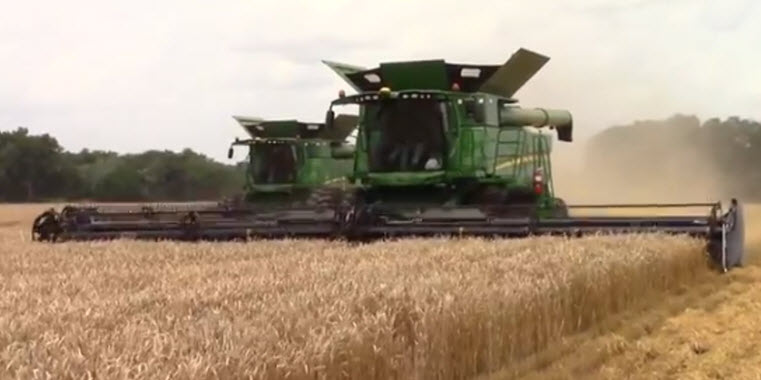Farmers would see higher USDA commodity loan rates and crop-insurance incentives to grow crops such as wheat and soybeans, as well as consider double-crop options, as part of a $500 million proposal in a Ukraine aid package released by the White House on Thursday.
President Joe Biden put forward a $33 billion package of aid for Ukraine, the bulk of which — about $20.4 billion — would go toward military aid for Ukraine and NATO allies. The package, which the White House pitched for Congress to pass, also includes provisions to help with global food security, which includes aid for U.S. farmers to boost production.
The language included in the White House package calls for $500 million to boost domestic food production. The funds would support the production of U.S. food crops, for example, wheat and soybeans, that are experiencing a global shortage because of the war in Ukraine.
“Through higher loan rates and crop insurance incentives, the request provides greater access to credit and lowers risk for farmers growing these food commodities, while lowering costs for American consumers,” stated a White House fact sheet on its aid proposal.
Reuters, quoting an unnamed USDA official, reported the package includes “about $100 million to pay for a $10-per-acre incentive to farmers — paid through crop insurance premiums — for a soybean crop planted after a winter wheat crop in 2023, the official said.”
Staff for the Senate Agriculture Committee told DTN at a field hearing on Friday that they were briefed on some of the details of the package on Thursday, but they had not seen the specifics of the request from the Biden administration.
About $400 million would go toward crop loans to encourage production of more crops such as wheat. USDA commodity loans allow farmers to take out non-recourse loans at rates based on each commodity. Nationally, the wheat rate is $3.38 per bushel (bu), while soybeans is $6.20/bu and corn is $2.20/bu. The rates do fluctuate by county. Marketing Assistance Loans (MALs) allow farmers to take out a loan at harvest so they can hold grain until prices are higher. In lieu of a MAL, farmers also can opt for a Loan Deficiency Payment (LDP).
Farm groups have been calling for Congress to increase the loan rates because MALs and LDPs have lost their effectiveness as short-term financing tools because of the low price points used for the loans.
“We would like to see wheat production encouraged throughout the nation and incentivize both spring and winter wheat growers,” said National Association of Wheat Growers CEO, Chandler Goule. “It is important that we take a holistic approach to ensure that we have an adequate supply of food crops to meet the emerging humanitarian needs. U.S. wheat farmers produce the best, highest quality wheat and should be supported during this time of global food insecurity.”
IMPACT OF RUSSIAN INVASION
Biden, in announcing his proposed aid package, talked about the impact the Russian invasion has had on Ukrainian production and exports. Ukraine is responsible for about 10% of global wheat exports and roughly 50% of sunflower exports. Ukraine also is a major corn exporter.
“Putin has asserted sanctions are blocking food from Ukraine and Russia getting on the market — the sanctions we’ve imposed on Russia. Simply not true,” Biden said. “Putin’s war, not sanctions, are impacting the harvest of food and disrupting the movement of that food by land and sea to nations around the globe that need it.”
The president added that the funding package would help ease rising food prices in the U.S. and abroad. He added, “It’s going to help support American farmers produce more crops like wheat and oilseed, which is good for rural America, good for the American consumer, and good for the world.”
Groups such as the World Bank are forecasting that global commodity prices will keep rising in 2022 and remain at high levels through the end of 2024.
The Biden administration on Wednesday also announced that USDA and the U.S. Agency for International Development (USAID) are drawing down the full balance of the Bill Emerson Humanitarian Trust (BEHT) as part of an effort to provide $670 million in food assistance to countries in need because of Russia’s invasion of Ukraine.
###
DTN/NAWG


